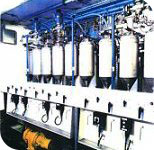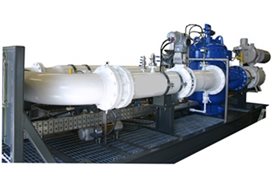The IsoFraction LNG (Liquefied Natural Gas) sampling system is unique when compared with other solutions for this application in that it is supplied with a performance guarantee.
The IsoFraction LNG sampler comprises of a gas sampling system with an integrated vaporisation, stabilisation and control system to ensure control of the phase change of the LNG to gas with minimal lag. This sampling process provides improvements over conventional methods due to the high volume of gas flowing through the system which ensures representivity of the gas both sampled, and fed to a GC.
3 samples are taken and held in the Constant Pressure Sample Receivers. The use of fixed pressure receivers allows minimal atmospheric or cross batch contamination and a large number of small samples to maximise batch representivity.
Refined Product Sampling

Our range of sampling systems are all designed to ensure maximum representivity and have fast-acting samplers to ensure sufficient grabs samples are taken to avoid sample bias. Our systems are designed to minimise the cross contamination that can occur from different products being transferred through the same pipeline. The sample storage and handling equipment is designed to be suitable for the products being sampled and the needs of the laboratory.
Both probe sampler and bypass loop system are available for refined product sampling depending upon application. Bypass loop systems offer the option for on-line instruments such as densitometers to be integrated as part of the sampling loop.
Bunker Fuel Sampling

Accurate sampling of bunker fuel for BS&W and viscosity measurement is crucial to the successful operation of marine vessels. Taking a representative sample of bunker fuel oil during the transfer between seller and buyer has always been an area of potential dispute. Any supplier who can offer a guarantee of quality gains a significant competitive advantage and an operator who is confident in the quality of their fuel is secure in the knowledge of engine integrity. Bunker fuel oil sampling is therefore necessary to detrmine the quality of the fuel oil.
To maintain a record of the transaction, a bunker fuel oil sample is often divided for each party involved. If this operation is performed by hand it renders the whole process meaningless by further compounding errors. Divided bunker fuel oil samples often contain different fuel compositions that can be confusing and lead to costly dispute. Inaccurate samples are a gamble with high stakes and large potential losses.